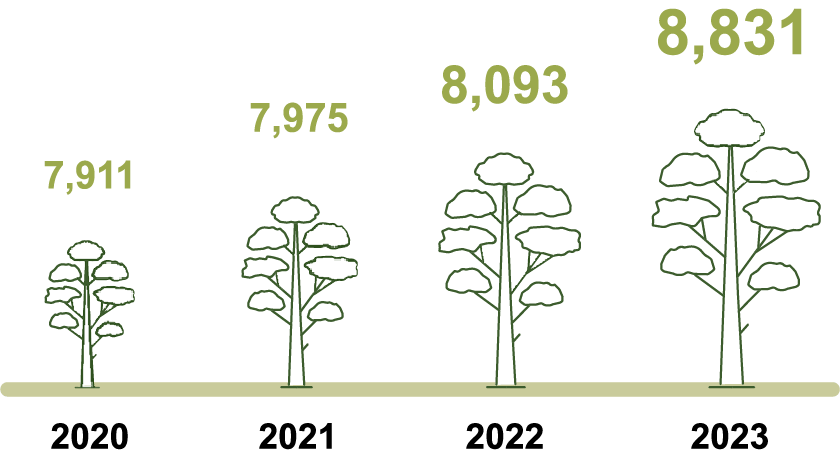BETTER Planet
Our unique business model is to collaborate with internationally renowned hotel operators under well-recognized brands, including Marriott, The Luxury Collection Hotel, Okura, Le Méridien, Banyan Tree, Hilton, DoubleTree by Hilton, Sheraton, Holiday Inn and Meliá brands. By leveraging the expertise of our in-house development team, with technical support from international hotel operators.
AWC recognized that each affiliates’ performances can considerably impact to AWC’s performance. Therefore, AWC have established AWC Groupwide Commitment and have worked to incorporate those targets into each affiliate properties. AWC also encourage our affiliates to adopt leading practices from our partners."
Climate Strategy
Target: To become a carbon-neutral organization (Scope 1 and 2) by 2030


Working under the Better Planet Pillar, AWC developed the Strategic Initiatives on Climate Strategy, underpinning the company’s target to become a carbon neutral business by 2030. The Climate Strategy focuses on monitoring and assessment the volume of greenhouse gas emissions across all AWC operations, starting from raw material sourcing to the delivery of our products and services that complied with the GHG assessment standards as follow:
- 2019 Refinement to the 2006 IPCC Guidelines for National Greenhouse Gas Inventories
- Assessment Guidance for carbon footprint of organization, The Thailand Greenhouse Gas Management Organization (Public Organization): TGO
- ISO14064-1:2018
- GHG Protocol Corporate Accounting and Reporting Standard
- GRI standard - GRI 305 Emission 2016
To leverage the AWC’s capacity to help combat climate change and reduce GHG with measurable and progressive outcomes, our energy efficiency plan is certified by international recognized certifications such as LEED and EDGE etc. In addition, we shape our investment strategy towards energy technology projects and renewable energy transition - the result of which helps reduce energy costs. In line with this, the company will launch a green purchasing and low carbon tourism program contributing to low-carbon products and services. With the intention to reduce our carbon emissions, carbon storage and carbon offsetting activities are to be integrated in AWC’s tree planting activities, expansion of green spaces, and carbon credit trading. Engaging with the local community and generating more incomes from low carbon products and services are also enablers to create value.
Climate Risk Management
AWC integrates climate risk management into our business strategy to enhance resilience and long-term value creation. In line with the IFRS S2 Climate-related Disclosures, the company identifies Physical Risks, Transition Risks, and Transition Opportunities. These reflect our approach to addressing and adapting to risks arising in both the present and the future, while also capturing new business opportunities aligned with climate transition.
2024 PERFORMANCES
Total Greenhouse Gas Emission (Scope 1 & 2)
(Unit: Ton CO2eq)
| Scope | Unit | 2021 | 2022 | 2023 | 2024 |
|---|---|---|---|---|---|
| Scope 1 | t CO2eq | 9,791.90 | 9,442.74 | 12,321.62 | 11,426.99 |
| Scope 2 | t CO2eq | 69,748.09 | 83,605.31 | 95,170.53 | 103,580.99 |
| Scope 3 | t CO2eq | - | 47,906.77 | 57,952.40 | 59,573.16 |
Remark: 1) Scope 3 emission data have been only collected from 2022 onward
AIR QUALITY MANAGEMENT
AWC’s air quality management has been established at both under-construction sites and operating sites. Air quality management includes control and prevention, impact reduction, and monitoring of air quality in the atmosphere in compliance with relevant laws and standards, with environmental impact assessment criteria (EIA), in line with National Ambient Air Quality Standards.
During the pile construction phase, we monitor particulate matter 10 (PM10) and particulate matter 2.5 (PM2.5) pollution daily and report the air quality weekly. Moreover, we measure pollution such as carbon monoxide (CO), nitrogen dioxide (NO2), and sulfur dioxide (SO2) monthly. When the pollution exceeds the standards, the company temporarily ceases construction to reduce the amount of pollution and to ensure the air quality of the construction sites meet the relevant standards.
Energy Management
As a property developer, the Company has recognized that the electricity usage within buildings and facilities is the major source of greenhouse gas emissions. Therefore, to achieve the carbon neutrality goal by 2030, the Company has outlined energy management and greenhouse gas reduction strategies in four main parts, aimed at reducing greenhouse gas emissions from core business activities
Target: Reduce Specific Energy Consumptions (SEC) 11% from baseline by 2030
Our energy efficiency management process is meticulously structured to analyze energy use and consumption through comprehensive data collection and evidence-based methodologies. This systematic approach enables us to identify key areas of significant energy consumption and uncover opportunities for enhancing energy performance.
Energy Efficiency Management Process
| Processes | Description |
|---|---|
| 1. Data Collection and Analysis |
|
| 2. Benchmarking and Comparison |
|
| 3. Identifying Significant Energy Use Areas |
|
| 4. Implementing Energy Saving Initiatives (ESIs) |
|
| 5. Conducting Audits |
Engage consultants for ASHRAE Level 1 Energy at key facilities as following processes:
|
| 6. Performance Improvement and Monitoring |
|
| 7. Continuous Improvement |
|
Training on Energy Efficiency Management and Cultural Change
Our commitment to energy efficiency is supported by comprehensive training programs aimed at raising awareness and optimizing energy behavior among our employees. All programs are designed to instill a culture of energy conservation and drive substantial reductions in energy consumption across all levels of the organization.
- Educated employees on selecting high-efficiency chillers to enhance cooling systems' energy performance.
- Provided in-depth knowledge on the installation and benefits of large-scale solar photovoltaic rooftop systems.
- Introduced the Energy Commitment Goal Card to track and achieve energy conservation targets.
Each training session is tailored to specific aspects of energy management, ensuring that employees receive relevant and actionable information that can be applied to their daily tasks and responsibilities.
By investing in these training programs, we not only enhance our operational efficiency but also empower our employee to contribute to our sustainability goals, creating a company-wide commitment to reducing energy consumption and supporting a low-carbon future.
2024 PERFORMANCES
Total Energy Consumption
(Unit: MWh)
WATER STEWARDSHIP
AWC recognizes water as a vital natural resource for the real estate sector, especially for its hospitality business, as our core business revolves around customer service. Additionally, the potential impact from climate change risks creating water scarcity which, coupled with changes in policies and regulations, could potentially affect the Company's operational costs.
With these considerations, the Company places significant emphasis on efficient utilization of water. This includes assessing water use/water stress, promoting responsible water usage and formulating water management guidelines to enhance efficiency. The objective is to mitigate the risks posed by water scarcity to the Company's operations.
Consequently, AWC has set clear long-term targets to reduce water consumption intensity per revenue by 20% by 2030 and short term by 14% by 2027 Additionally, the Company is implementing projects to promote water efficiency in collaboration with all relevant stakeholders. These initiatives involve monitoring water consumption, supporting systematic water recirculation for both internal and external benefits, seeking additional water reserves to ensure business continuity, and communicating operational plans to all relevant stakeholders through appropriate channels such as training employees on water management under ISO 14001 includes efficient water use, conservation methods, legal requirements, and emergency response. It emphasizes monitoring, recycling, and continuous improvement, highlighting the importance of employee roles and regular reviews for sustainability., company’s targets and impact in water scarcity and stress, and innovative thinking and problem solving to raise awareness of water reduction and efficiency in their working areas, and identifying significant water use activities.
Water Management Process

Waste Water Treatment
AWC has installed Smart Condenser Water Treatment System across all relevant properties, featuring a central control center that monitors key parameters and remotely adjusts operations to optimize bleed-off water. AWC have proactively invested approximately THB 100 million in a centralized wastewater treatment plant with advanced Membrane Bioreactor Technology at Asiatique 1.0, the centralized plant ensures effluent quality consistently meets local regulatory requirements. In the future, this high-quality effluent will be utilized in a Recycled Water Plant to supply recycled water for cooling to AWC, irrigation, and flushing for the Asiatique 2.2 Project in order to reduce freshwater consumption, where possible.
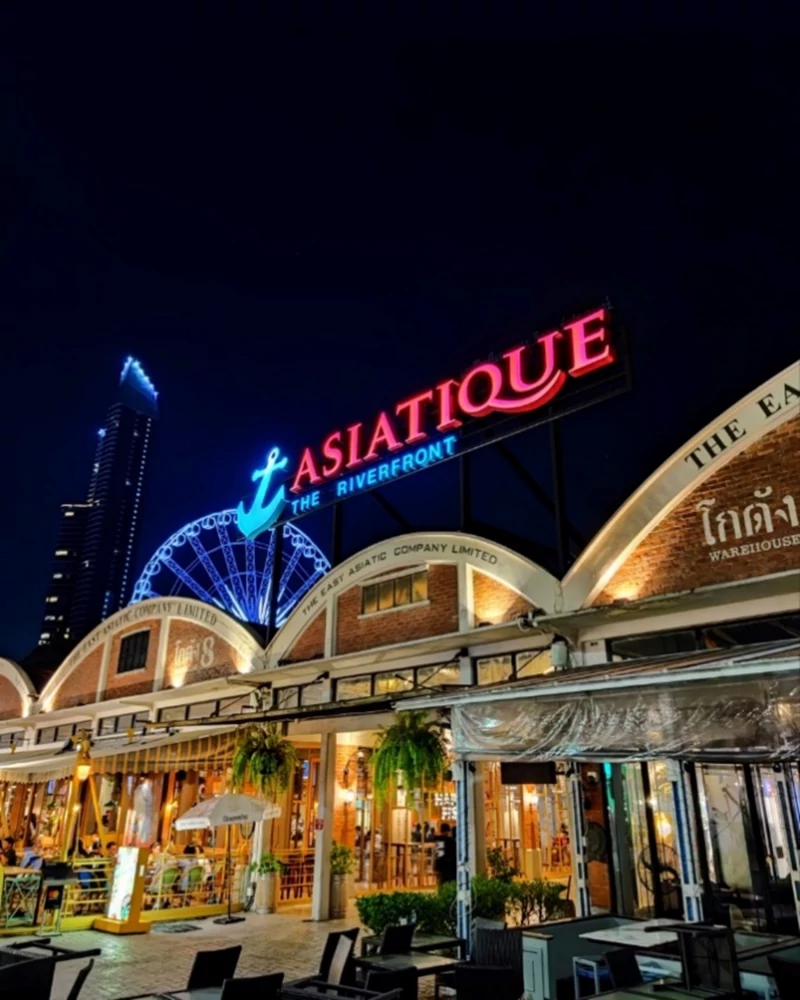
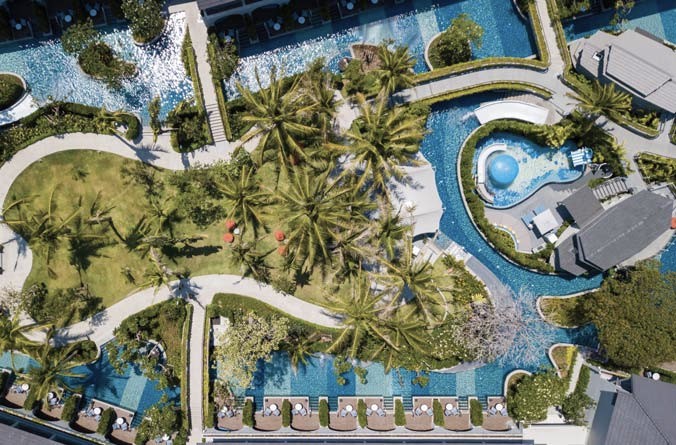
Water Recycling
AWC is advancing our sustainability efforts by upgrading wastewater treatment systems to reduce freshwater consumption through effective recycling. For instance, Meliá Koh Samui will commence using its upgraded wastewater treatment system from November 2023, with plans to recycle 210 cubic meters of treated wastewater annually for garden irrigation starting in 2026. Similarly, Banyan Tree Jomtien Pattaya, currently under construction, is incorporating wastewater treatment upgrades to facilitate internal water recycling. These initiatives support our goal of reducing freshwater use by repurposing treated wastewater for cooling towers, and other sustainable applications, thereby enhancing overall water efficiency.
Water Reuse
Promoting water reuse for irrigation within project areas, particularly in the hotel sector, is a key strategy for enhancing sustainability. For instance, Sheraton Samui Resort, Banyan Tree Samui, and Phuket Marriott Resort and Spa, Nai Yang Beach etc. We have reused water for planting green area, this practice not only reduce freshwater consumption but also supports the maintenance of green spaces, demonstrating a commitment to efficient water management and environmental stewardship.
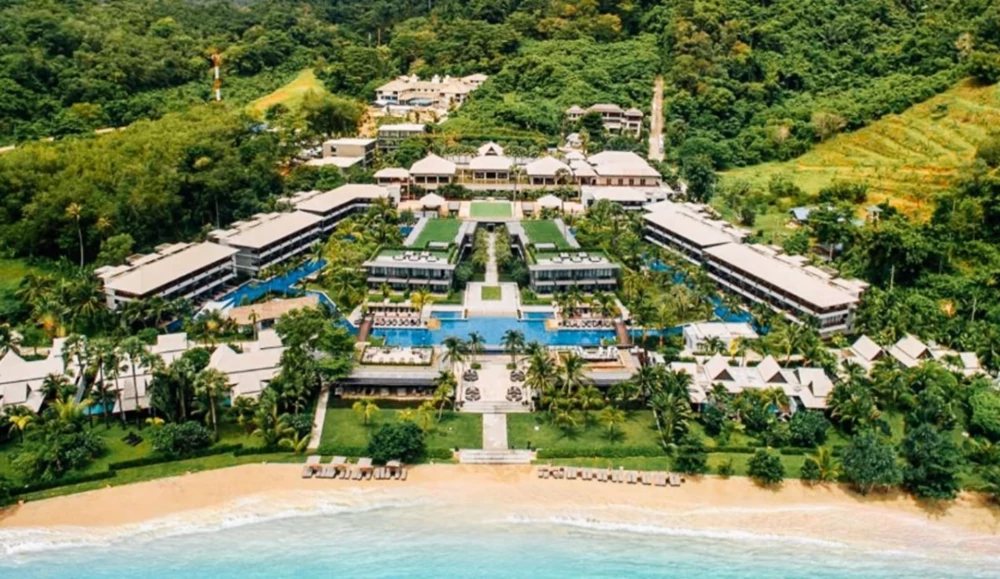
2024 PERFORMANCES
Total Water Consumption
(Unit: Million Cubic Meters)
Circular Economy
Long-term target: Zero waste from operation to landfill by 2030
Reduce 75% of total construction waste to landfill by 2030
Short-term target: Reduce 17 % of total construction and operation waste to landfill by 2026

Waste Assessment
Our waste assessment process focuses on systematically identifying and managing waste generated across our operations. This involves a series of structured steps designed to understand waste production, identify significant areas of generation, and uncover opportunities for improving energy performance.
| Processes | Steps | Description |
|---|---|---|
| 1. Preparation | 1.1 Establish Waste Management Plan | Identify significant area of waste generation and opportunities to develop the plan outlining waste management goals and strategies. |
| 1.2 Specify Measurable Targets | Set clear, quantifiable objectives for reducing waste. | |
| 1.3 Educate Teams | Train operation team, project teams and subcontractors on waste management practices and objectives. | |
| 1.4 Develop Waste Tracking Approach | Compile a comprehensive document to guide and track waste management efforts. | |
| 2. Implementation | 2.1 Apply Waste Reduction Measures | Implement strategies to minimize waste generation at the source, such as switching from single-use packaging to refillable containers, replacing single-use plastic water bottles with reusable glass bottles, and digitalizing workflows to reduce paper usage. |
| 2.2 Monitor Practices | Regularly track and assess waste generation and segregation practices. | |
| 3. Evaluation | 3.1 Systematic Data Collection | Collect waste data using tracking forms to ensure accuracy. |
| 3.2 Compare Performance | Assess actual waste generation and recycling rates against established targets and industry benchmarks. | |
| 3.3 Conduct Monthly Audits | Collaborate with 3rd party to audit waste management practices and track performance in line with LEED/TREES standards. | |
| 4. Continuous Improvement | 4.1 Review Metrics | Conduct a comprehensive waste management inspection across AWC's business units and headquarters operations to evaluate the effectiveness of waste segregation practices. This inspection will also aim to enhance employee adherence to proper waste disposal procedures. Detailed guidance and training have been provided to all employees to ensure waste is sorted correctly, thereby improving recycling efforts and minimizing contamination throughout the organization. |
| 4.2 Innovation and R&D | Dedicate monetary, workforce, and other resources to explore new ideas and technologies. |
Innovative Approaches to Waste Reduction
Our company is committed to reducing waste through strategic investments in innovation and research and development (R&D) resources. We dedicate monetary, workforce, and other resources to explore new ideas and technologies aimed at minimizing waste generation from our business operations. Below are some key initiatives and projects demonstrating our efforts:
1) Circular Economy Practices
- The reConcept project, AWC's initiative to promote the circular economy, focuses on refurbishing and repurposing old items from 5-star hotels. Launched in 2020, it aims to create products that embrace recycling and upcycling. Over the past year, reConcept introduced two refurbished furniture collections, reducing carbon dioxide emissions by 916 metric tons. The products are available at the reConcept store in Asiatique The Riverfront Destination and online at the "Reconcept Décor" e-commerce platform, launched in 2023. Find more information at www.reConceptDecor.com
- Design for Disassembly: We are exploring modular design principles that facilitate easier disassembly and reuse of building components in future projects. This approach not only extends the lifecycle of materials but also promotes sustainability.
- Product Lifecycle Management: Implementing systems to track materials throughout their lifecycle allows us to promote reuse and recycling. By understanding the journey of each material, we can optimize its usage and reduce waste.

2) Digital Technologies
- Building Information Modeling (BIM): Utilizing BIM helps us optimize material quantities, plan for deconstruction, and simulate construction processes. This digital technology allows us to minimize waste by ensuring precision in material usage and efficient planning.
- Internet of Things (IoT): Integrating IoT devices enables us to monitor material usage, optimize supply chain logistics, and reduce over-ordering. These smart technologies provide real-time data that enhances our ability to manage resources effectively.
3) Waste Minimization Strategies
- Lean Construction Principles: We apply lean construction methodologies to streamline processes, reduce excess inventory, and minimize non-value-added activities. This strategic approach helps us identify and eliminate waste throughout our construction projects.
- Energy-Efficient Construction: Investing in energy-efficient building practices reduces material waste associated with construction and operation. These practices not only save energy but also contribute to a reduction in overall waste production.
4) Prefabrication and Factory Control
- Prefab Works at Factory: By conducting prefabrication work in a controlled factory environment, we can better manage and reduce waste. This method allows for precise material usage and minimizes on-site waste generation.
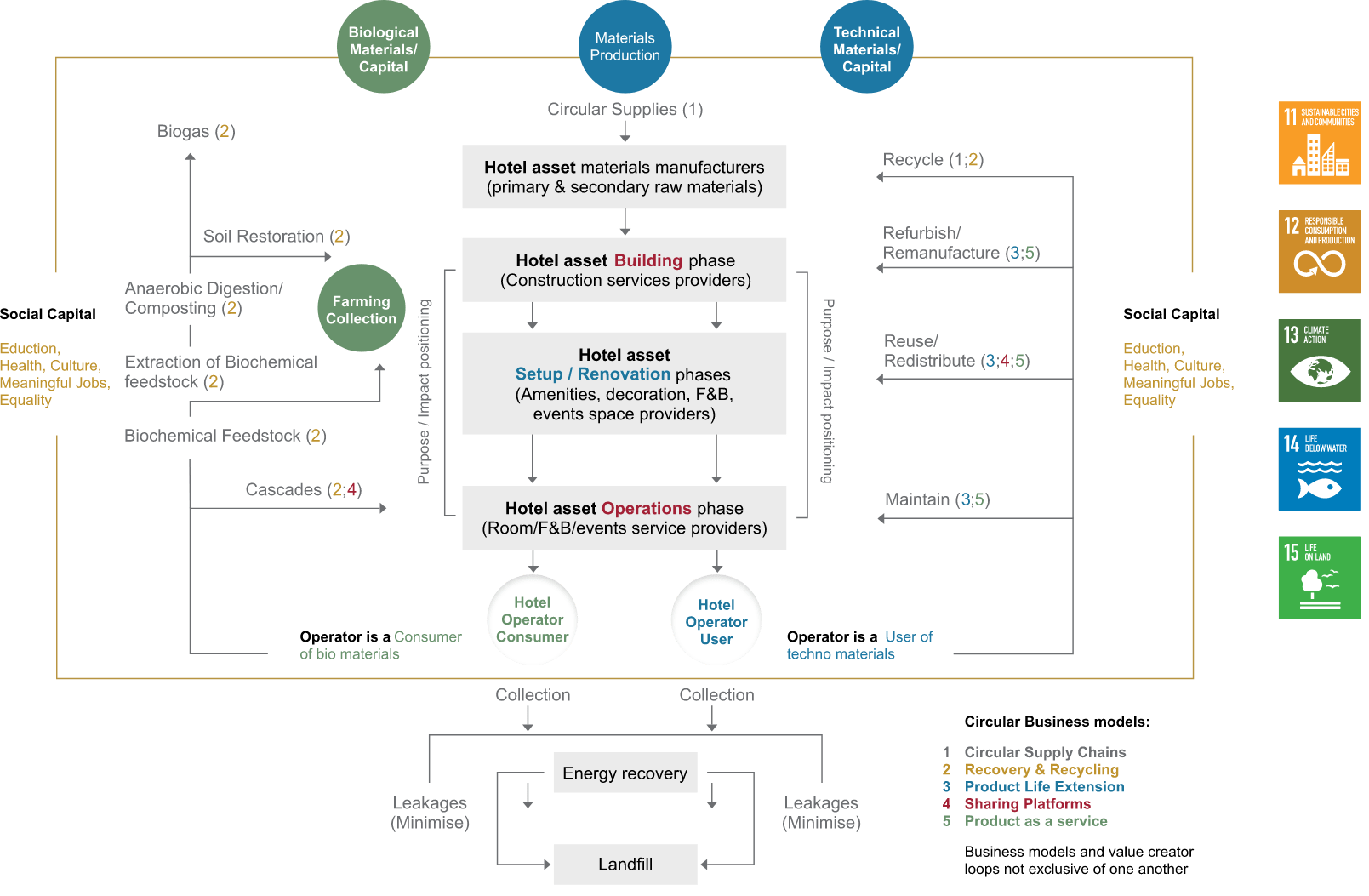
At AWC, as a hotels business, we prioritize delivering exceptional guest experiences while minimizing our environmental impact. As our core focus is on hospitality, we do not extensively collect data on plastic packaging (e.g., weight, recyclable, compostable) as it is not directly applicable to our operations. Our efforts concentrate on energy efficiency, water conservation, waste reduction by partnering with sustainable renowned hotel operators . By aligning data collection with our core objectives, we aim to make a targeted impact in reducing our ecological footprint while maintaining responsible practices
2024 Performances
Total Waste Disposed
(Unit: Metric Tonnes)
Food loss and Food Waste Management
Target: Reduce food waste and food loss 50% throughout the supply chain by 2030
AWC is dedicated to minimizing food waste and diverting waste from landfills, adhering to the Food Recovery Hierarchy. Through circular economy practices, AWC aims to reduce food loss at every stage, from production to consumption. This includes producing food based on demand, segregating food waste, and redistributing surplus quality food to communities. Additionally, AWC collaborates with various partners, including government agencies, private businesses, and non-profit organizations, to promote the efficient use of surplus food and food waste. These collaborative efforts are guided by circular economy principles and food safety standards.
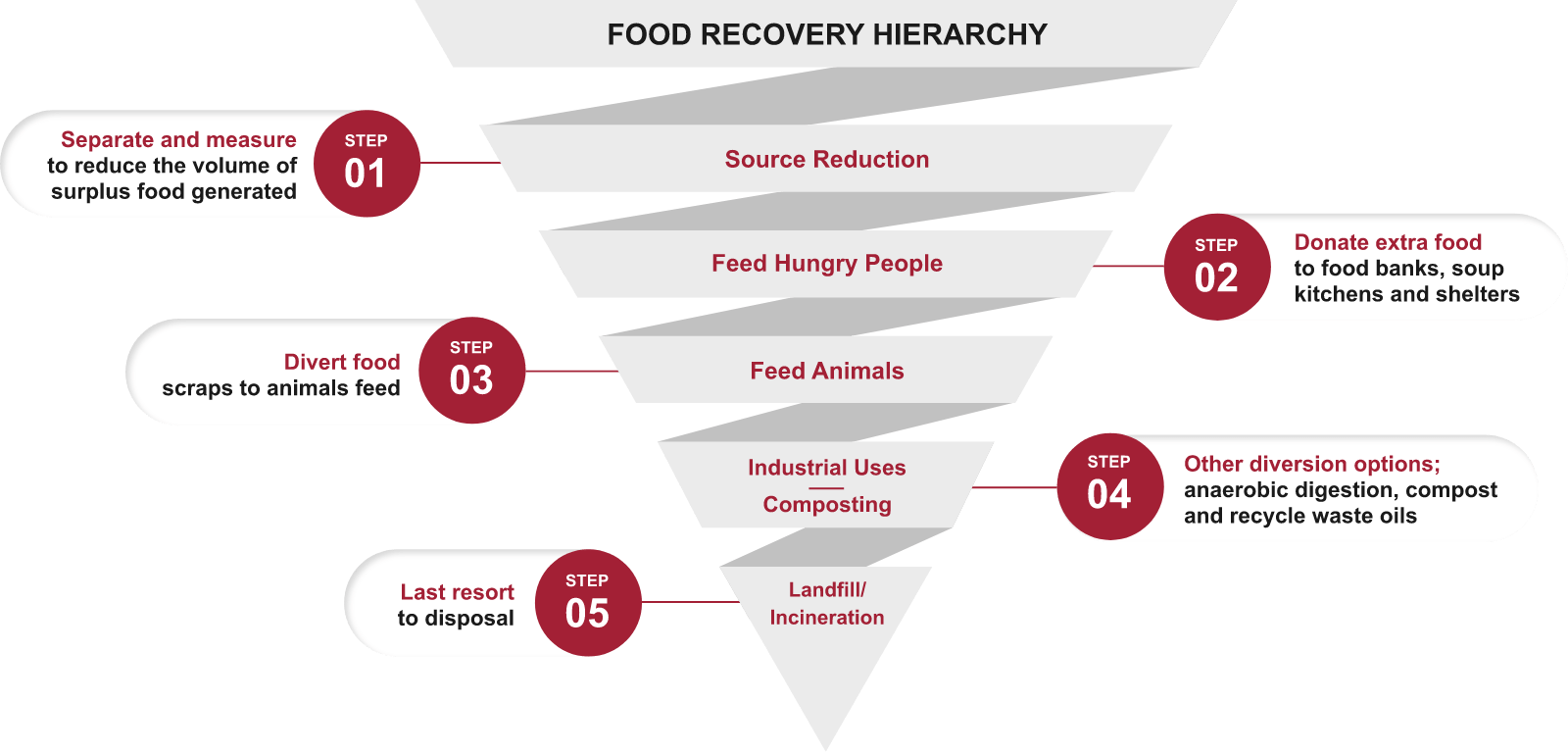
Additional Information:
| Food’s life cycle stage | Source | Measurement | Mitigation and Reduction |
|---|---|---|---|
| Procurement and purchasing |
|
Quantify the excess food purchased beyond actual demand. |
|
| Storage and Inventory Management |
|
Calculate the amount of food that spoils before its intended use. |
|
| Preparation and Cooking |
|
Measure the amount of food that is leftovers after preparation |
|
| Serving and Consumption |
|
Estimate the amount of leftovers on plates or buffet station by guests. |
|
| Post-consumer Waste |
|
Measure the amount of edible leftovers after meals. |
|
2024 Performances
Total Weight of Food Loss & Waste Volumes
(Unit: Metric Tonnes)
Group-wide Commitment
Business Driver: AWC towards circular economy
- Each Thai people normally generates waste at 1.15 kilogram per person. In 2018, there were 28 million tones of waste generated in Thailand. With lack of appropriate waste management, the result will interfere both direct and indirect impact to environment. In addition, the disruption to food supply due to the increasing number of world population will worsen the situation waste in both a business and moral imperative.
- Hence, the Circular Economy will be the key solution to solve those problems as it promotes the regenerative model of make-use-return. This concept also includes the approaches of “resource maximization, waste separation, and proper disposal” to preserve natural resource and pass it to the next generations.
At AWC, it is our priority to reduce the overall FLW and to employ circular model across our hotel affiliates’ value chains. By that, we encourage our affiliated hotels to adopt and uphold the specific FLW commitments that were announced by each of the hotel brands.
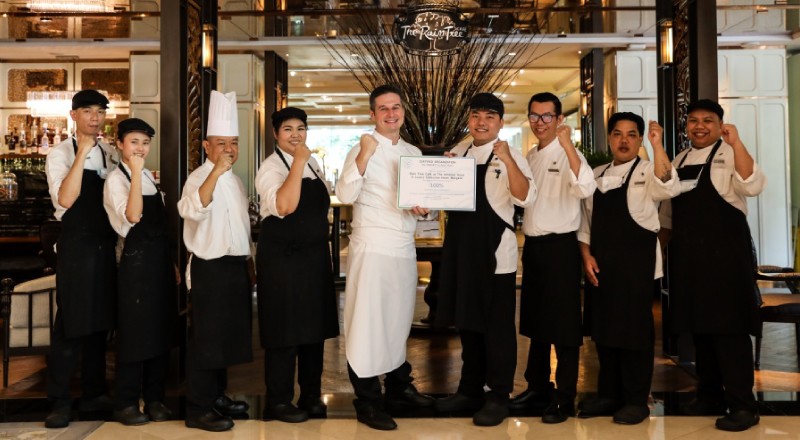
Banyan Tree’s
Banyan Tree’s long term goals are to reduce food waste by 30% and divert 50% from landfill by 2025, with a 50% reduction and 100% diversion by 2030.
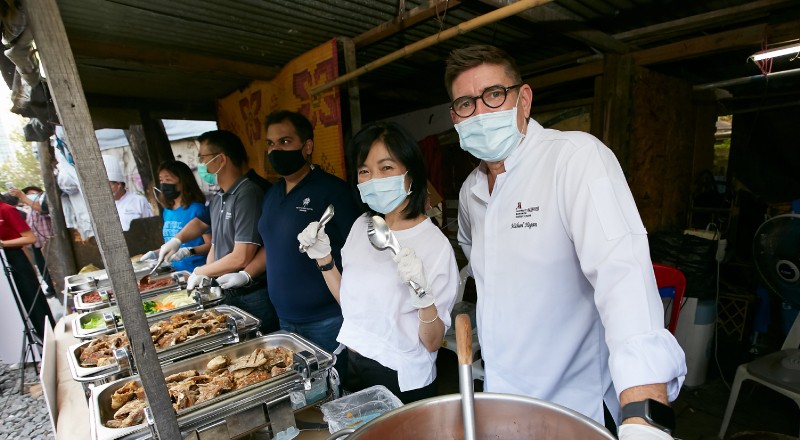
Hilton
Hilton is committed to cutting food waste by 50% by 2030.
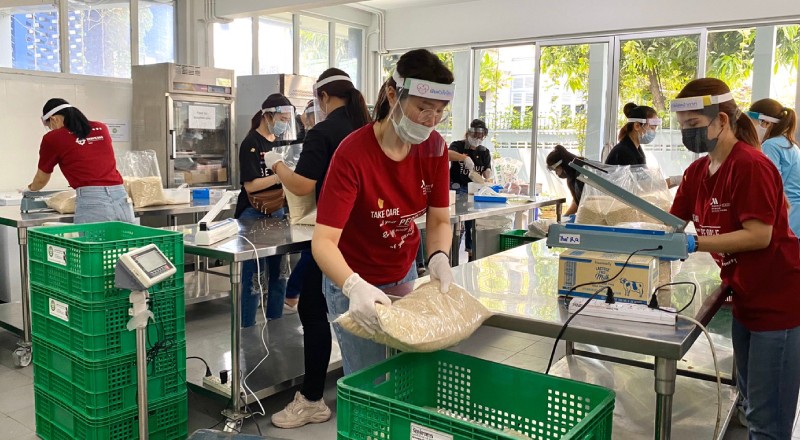
Marriott
Marriott is committed to reducing food waste by 50% by 2025
Sustainable Packaging Initiatives
At AWC, we recognize the critical role that packaging plays in our environmental footprint, particularly within our hospitality and retail operations. Our commitment to sustainability drives us to continuously innovate and adopt practices that minimize negative impacts on the environment and society. To this end, we have implemented a comprehensive Sustainable Packaging Policy that aligns with our sustainability goals.
- We aim to phase out the use of single-use packaging by transitioning to reusable packaging options. For instance, we have replaced plastic water bottles with glass bottles in all our operating assets that reduces single-use plastic seals and plastic bottles post-consumption, promoting the use of reusable glass bottle crates.
- We are transitioning our complimentary packaging to materials that are reusable, recyclable, or contain recycled components. For example, we use wooden boxes that are easy to reuse or recycle, as well as paper packaging made with recycled materials such as the mooncake collection packaging at The Okura Prestige Bangkok and the lunar box collection at Bangkok Marriott Marquis Queen's Park, both of which feature reusable and recyclable wooden boxes.


- We have invested in finding environmentally friendly packaging alternatives, such as switching to paper bags, compostable plastics, or locally sourced natural materials that are 100% biodegradable.
- We collaborate with credible recycling partners to ensure efficient recycling of post-consumer packaging within our operations. Each hotel implements a clear process for recording and segregating different types of waste. For example, The Okura Prestige separates recyclable waste and collaborates with the district office under the Bangkok Metropolitan Administration. This partnership has significantly increased recycling rates, particularly for plastics and paper, advancing our sustainability goals.
BIODIVERSITY
Asset World Corp Public Company Limited and its subsidiaries operate the businesses with transparency and recognize the importance of environmental protection. Therefore, apart from promoting environmental protection, the company is focusing on biodiversity protection and against deforestation. As such, the Company provide trainings for employees, communities, and related stakeholders to cultivate and understand the efficient use of resources.
BIODIVERSITY EXPOSURE AND ASSESSMENT
| Number of Sites | Area (Hectares) | |
|---|---|---|
| Overall: total number of sites used for operational activities and construction areas | 45 | 91 |
| Assessment: biodiversity impact assessment for sites used for operational activities | 33 | 85 |
| Exposure: number of sites that are in proximity to critical biodiversity area | 8 | 42 |
| Management Plans: number of sites that have a biodiversity management plan | 8 | 42 |
Activities for the Restoration and Conservation of Biodiversity
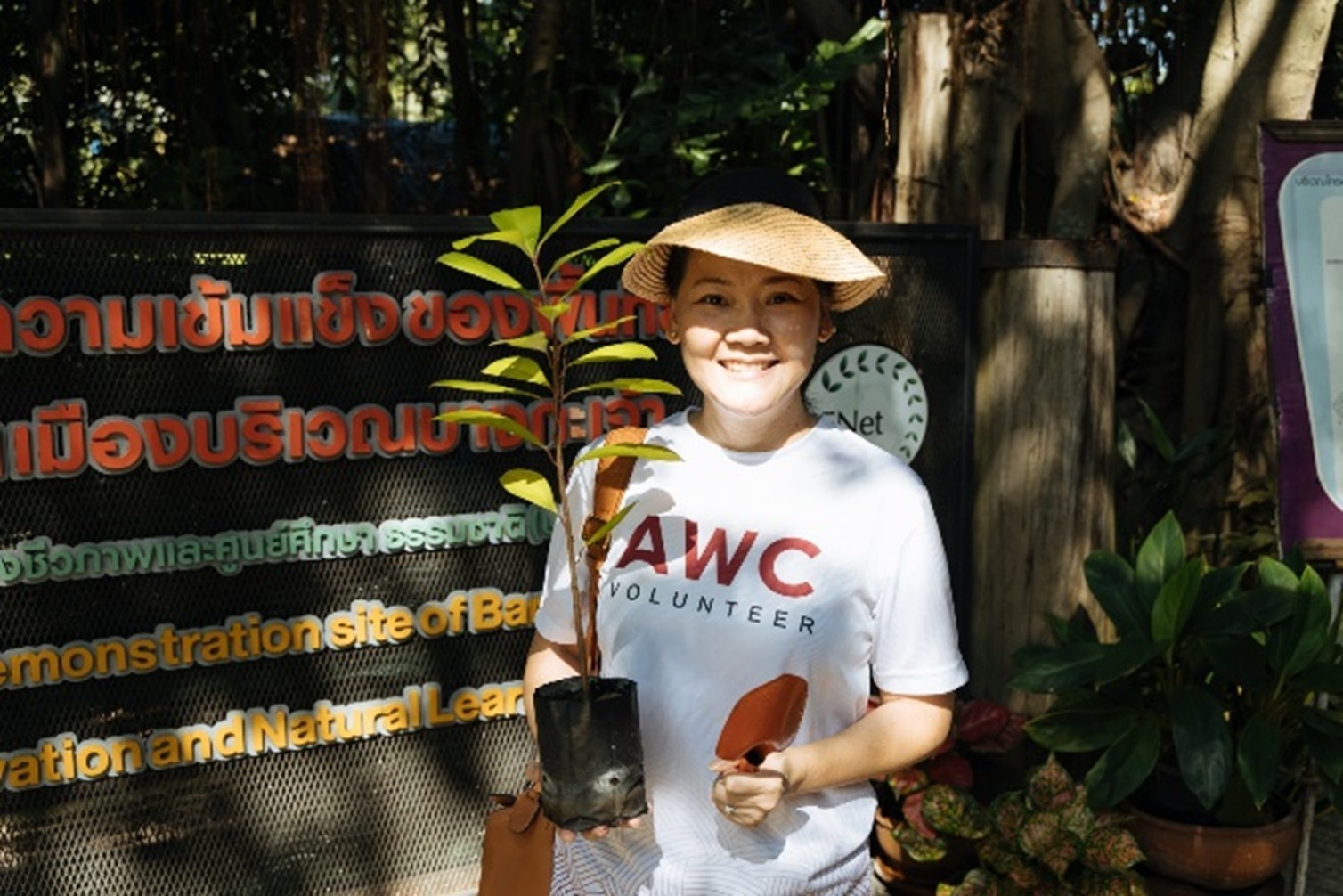
1. Tree Planting and Conservation Activities
Several AWC’s affiliated hotels have conducted tree planting and conservation activities to support the restoration of ecosystems and biodiversity in local communities. For example, Banyan Tree Krabi organized local tree planting and mangrove restoration activities in collaboration with schools in the Seedling Project. Banyan Tree Samui planted trees on its private beach to prevent coastal erosion and support sea turtle nesting sites. Hilton Sukhumvit Bangkok and DoubleTree by Hilton Sukhumvit Bangkok participated in tree planting activities in Bang Kachao, while Innside by Meliá Bangkok Sukhumvit planted mangrove trees with the Bang Pu Nature Study Center. These activities reflect the company’s commitment to promoting sustainable environments and engaging with local communities where its hotels operate.
2. Marine Ecosystem Restoration and Conservation
The restoration of coastal and marine ecosystems includes those such as the Banyan Tree Krabi’s seagrass conservation and restoration efforts in Thung Bay, and the Meliá Koh Samui hotel’s mangrove tree planting initiative to increase mangrove coverage. Vana Belle, a Luxury Collection Resort Koh Samui, also participated in mangrove planting to enhance the ecosystem. These initiatives reflect the company's commitment to driving sustainable development, supporting SDG 14 on the sustainable use of oceans and marine resources.
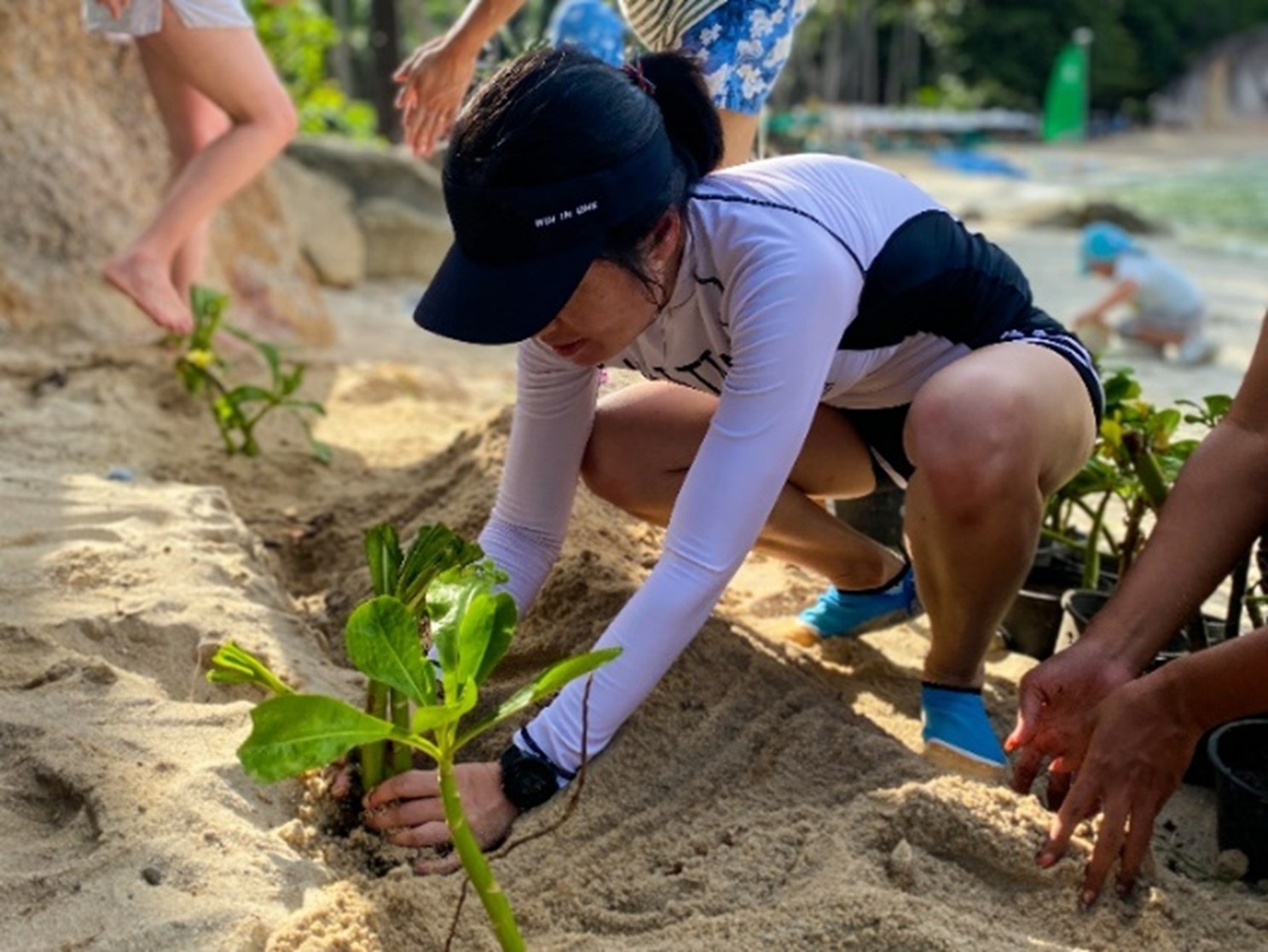
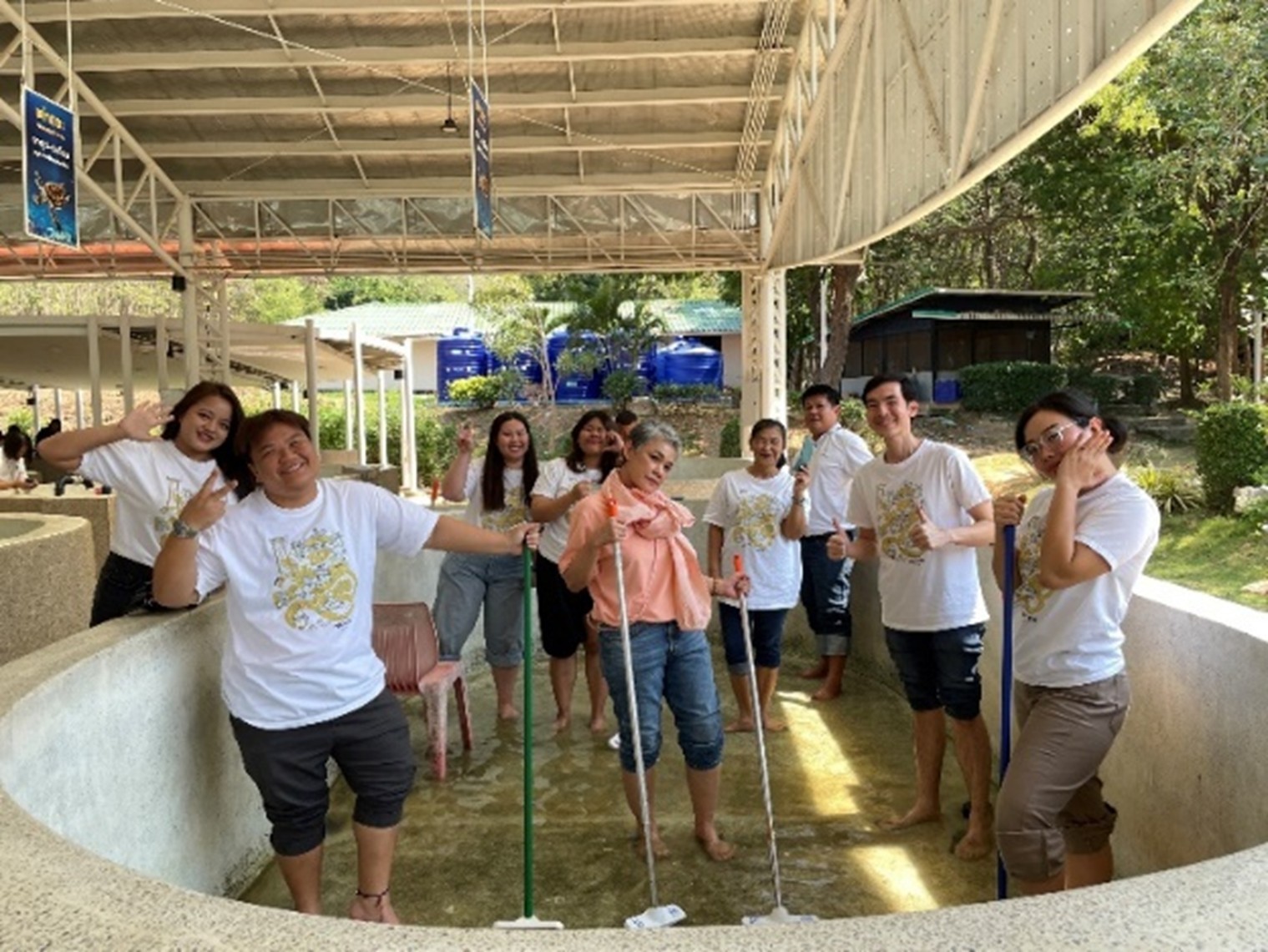
3. Educational Activities and Raising Awareness
The hotel organized activities to raise awareness and foster environmental consciousness among employees, guests, and communities through educational programs and hands-on experiences. Banyan Tree Krabi provided biodiversity training for its staff and organized nature walks to educate guests about local plant and animal species. Innside by Meliá Bangkok Sukhumvit carried out sea turtle conservation activities and organized cleaning programs for the turtle hatchery. These activities highlight the company’s commitment to promoting environmental conservation, raising awareness, and encouraging participation in sustainable development.
AWC Tree Planting Project
To achieve the carbon neutrality by 2030, the Tree Planting Project has been initiated with the objectives to expand green area through tree planting and conservation, as part of carbon offsetting programme. The tree planting project is implemented in all AWC’s operating assets, developing assets, and the voluntary foresting project.
PROJECT CATEGORY
Operating Category
Developing Assets
Voluntary Foresting Project
Number of tree planted at conserved area of AWC’s properties
